Any fanboy of United Parcel Service knows that they love one thing and one thing only: logistics. Well, if you share that same enthusiasm for coordinating complex systems, especially via the lens of cargo delivery, there’s promising news on the horizon. Devir USA’s new game Rhein: River Trade attempts to capture the glory and intrigue of freighting, all within the confines of a humble cardboard box. It’s actually sort of meta when you think about it.
Nevertheless, as geeky as this may all sound, when I heard there was a game dedicated to complex shipping practices, I became very, very excited. Does Rhein: River Trade deliver (groan), or is it something that should have been lost in the mail?
The concept for Rhein: River Trade — or RRT, as all the kids are calling it (note: this is a lie) — is dead simple. Players assume the roles of shipping companies who must send cargo up the Rhein river to far-flung destinations like Hamburg, Köln, Rotterdam, and even London. At the end of the game, whoever has the most money from their deliveries wins. Pretty simple stuff, but there are neat wrinkles to all this.
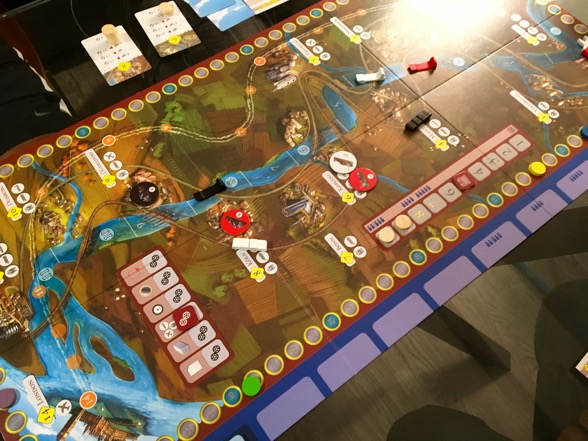
A snapshot of a game round.
First, there are contracts. Every round, players collect contracts that promise varying amounts of money for varying amounts of deliveries to various cities. For instance, sending 6 crates to Koblenz might net you $18 — as long as your precious cargo arrives within three game rounds. There’s some wiggle room with the order: players can often deliver one or two fewer crates than required, but that contract will net you less money. Deadlines, however, are strict, and should you fail to reach your destination on time, you’ll pay a small penalty and suffer the frustration that comes with wasted time, resources, and money. Just like real life!
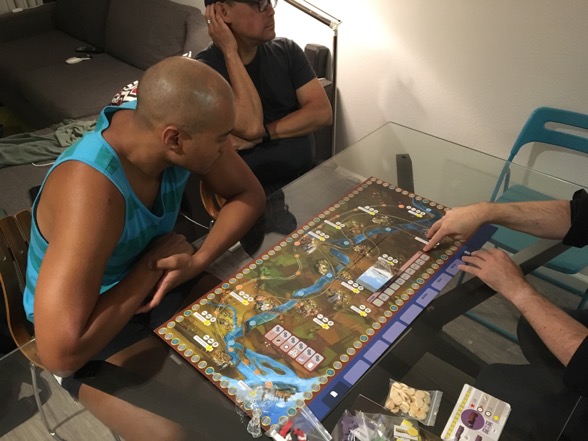
Intrigue as players scout out routes on the river.

Excitement builds with the arrival of poke.
The act of sending your junk down the river is the heart of the game. There are several transportation options available, all with their own advantages and drawbacks.
Planes go fast, but they’re expensive to book, and they only stop in a few cities. They’re also the only transportation that can deliver to London.
Trains have more room than planes, and they’re certainly cheaper than them too, but they’re also pricier than boats and can’t carry as much. Their biggest advantage is that they stop in nearly every city.
Ships have the most space for cargo, they’re the cheapest transportation, and they look the coolest. But unfortunately, ships only stop at every other city, which can make for some tricky maneuvering.
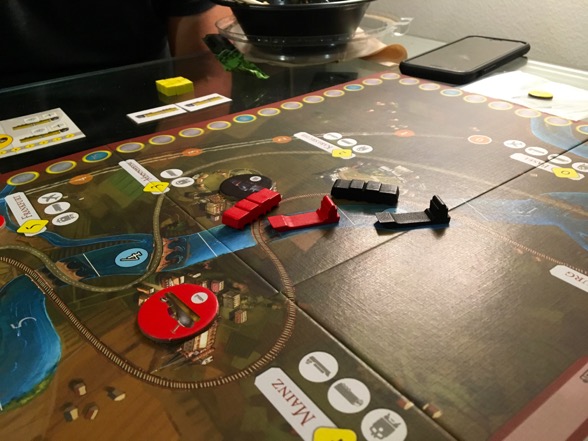
Barges and trains jockeying for position.
Oh and then there are trucks, which are truly the cheapest, but they barely carry anything; so like whatevvvs. (Actually they’re really useful to help you transfer goods from ships to a landlocked city).
Figuring out the best method of transportation to move your cargo from Basel (the starting city) to a destination up the river all in the allotted amount of time is the puzzle of Rhein: River Trade. Can you afford to send your goods on a slow barge lazily making its way up the river? Or maybe you need to pay a premium to get from Basel to Rotterdam tout suite. Loading fees and overnight charges cut into your profit margins, which makes planning the right transportation a key priority.
Luckily, players can share transports, and they can even do funky things like transfer from boats to trains or leave boxes overnight in one city so they’ll be collected the next day by an opponent’s airplane. The magic of logistics is at play, and all the fun is in making these systems work for you like a well-oiled machine.
Theoretically.
You see, Rhein: River Trade has problems. On the one hand, it’s a pure delight loading up your little cubes onto a train and seeing them off like parents at kindergarten. Watching your locomotive chug across the countryside is oddly satisfying in the same way that pushing a Matchbox Car on the floor was as a kid. But at a certain point, you’ll realize this game offers few thrills beyond nudging a little wooden piece down a river. That’s because the promise of this game – manipulating transportation to spectacular effect – never comes to fruition.
At each stage of the game there are lost opportunities.
Contracts:
Most of the contracts in the game offer the same profit margin. Sure, a delivery to faraway London will net me about $27, but chances are I had to pay $18 just to get it there, which means I would only net $9. I could just as easily earn the same $9 by investing $5 into a cheap delivery to Karlsruhe, which is only a few stops up the river from Basel. Why am I complaining about this? Because there’s no tension between choosing a rigorous contract vs a simple one. Go for a short contract. Go for a long contract. It doesn’t make that much of a difference (except your cargo won’t be tied up as long in a delivery with a short contract, which is always a perk).
Rhein: River Trade is not the sort of game that balances a bunch of short, weak contracts with a few long, lucrative ones. It’s too bad because the ol’ quantity vs. quality debate is a classic game — nay, business — dilemma, and its absence feels sort of weird. But alas, Rhein forfeits this added layer of decision-making by failing to substantially differentiate the profit margin in contracts. And even if the profit margins did vary greatly, the game itself doesn’t let players with cheap contracts get a competitive edge via sheer quantity. There’s no way to cycle through a bunch of little contracts. Players receive only one contract per round, and that’s it. Someone who focuses solely on small contracts will generally fulfill the same number of contracts as someone who focuses solely on faraway contracts. And so choosing contracts is less about defining a holistic shipping strategy and more about simply finding a city that’s en route to a destination you’re already headed to.
Well, now I’m fully harping; so let’s air another grievance: there’s no reward for finishing a contract early. No financial bonus, no rollover time for another contract, no nothing. As a result, there’s not a whole lot of urgency, and this is made worse by the generous amount of time players have to fulfill their contracts. The lack of a time crunch means that players don’t have to be terribly creative in sending their goods up the river, and more or less, Rhein: River Trade settles into a perfectly pleasant but not entirely thrilling pattern of loading cubes onto transports and watching them chug down the board.
Here’s the good news: in later rounds, as the game end looms, urgency does finally kick in, and suddenly, transportation becomes very important. You’ll be faced with some intriguing choices for sure, but it seems like too little too late.
Here’s the good news, part 2: the game comes with a variant that reduces every contract deadline by one round. Always play this way. It doesn’t transform Rhein into a heart-racing, forehead-sweating stress spiral, but it does add some much needed tension to the proceedings (and motivates some creative delivery schemes).
Loading Phase:
Probably the only significant benefit of finishing a contract early is that it frees up your cargo, which can now be used to fulfill a new shipment. That’s cool. It’s not terribly exciting, but it’s cool nonetheless.
In theory, what’s truly exciting about the loading phase is that it allows players to scramble onto different transports, forcing them to share cargo holds and work semi-cooperatively. But what winds up happening is that one person will generally buy up all the space on the ship or train or whatever, and then that’s it. Even if a player only needs to delivery 4 items to a city, that person will likely load extra pieces of cargo on speculation that a new contract will pop up down the river.
As a result, players wind up silo-ing onto different modes of transportation. Someone took the slow train? Fine. You’ll just take the moderate train for a nominal extra fee. The promise of piggybacking and cooperation doesn’t totally come to be, and there’s not a huge amount of dilemmas that come with picking an option. Maybe if people were limited to placing only a maximum of five pieces of cargo on each transport — or maybe three pieces on a turn, going around and around until everyone has placed what they want to place — then that would shake things up and force more interaction.
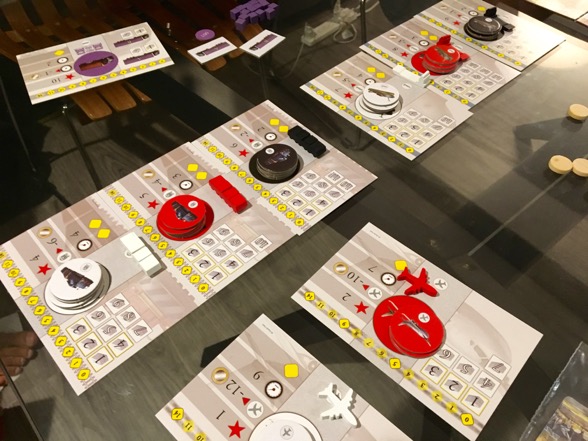
Every transport has its own card on which to place cargo (aka cubes). The circular tokens represent reservation markers.
There are also maybe too many transports. At higher player counts (the game goes up to five people), this isn’t too much of a problem. But a game of three can feel too loose at times. There’s almost always a cheap, decent option. In fact, airplanes, which are super speedy but cost the most to use, are seldom even touched until the end of the game. Why not have only a few cheap transports that everyone fights for, leaving the losers to suck it up with pricy shipping by air? It’s simply too easy to hitch a ride on a cheap train or boat.
By the end of the game, with time running out, people suddenly become willing to pay a premium to use fast planes, and honestly, that’s when Rhein: River Trade explodes into some really cool decisions, but having to wait that long to get to the good stuff is not ideal.
Reservations:
The real expenses in the game are not from loading fees, but from buying reservations. In order to drop your junk off in a city, you’ll need a reservation. Should you be sharing a transport, then there might be some nifty brinksmanship with your opponent — who will buy the reservation? It’s totally feasible that you’ll plop down the $7, and they’ll just piggyback along off of your investments. We like this. This is a fun idea.
But here’s the thang: if everyone shovels all their goods onto their own individual transports, the brinksmanship of buying reservations winds up kind of untapped. This idea of jockeying for power on a barge is cool, but it rarely comes into play.
Movement and Transfer
Once everyone has purchased their reservations, everything moves down the river (all in a specific order). This is the best part, mostly because it seems to always result in ridiculous sound effects around the table of foghorns and train whistles. Each transport has its own speed – some can only travel two spots down the Rhein in one round. Others can go nine (airplanes, obviously). However, too many reservations can short-circuit a journey. I won’t go into all the details of how it works, but if you are banking on your plane getting from point A to point D, and someone makes it stop at point C, it ain’t making it to D that round, and that could really mess up the timing. That’s fun.
But unfortunately, such a scenario rarely comes into play. First of all, players are rarely sharing the same transport; so reservation c–kblocks are few and far between. And even if you did get screwed over by someone else, you’re rarely affected (see the lack of urgency above) unless it’s a later round and there’s no more time left.
And since we’re talking about movement, what happens if a slow train winds up in front of the fast train? Does it slow down the entire railway? Nope. Too bad – could have been yet another interesting layer of strategy in terms of what transport to use and when.
The biggest gripe, however, is the concept of transferring goods. This feels like it should be the heart of the game. Isn’t that half the fun of logistics and just-in-time economics? Unfortunately, Rhein: River Trade does not make transferring between modes of transportation easy or even terribly useful. First off, you can only transfer between things if you’ve previously made a reservation at a city, which means that if your boat winds up in the same city as a train, but you didn’t buy a reservation in that city, you can’t offload your cargo onto the train.
Sometimes, you DO have a reservation, but nothing to transfer your goods to. No problem: just offload the stuff into the city and wait for a train to come by. One problem: you now must incur fees, which are on top of the initial loading fees, and don’t include a second round of loading fees to get onto the new train. This means it’s hugely more expensive to do this, and players have very little reason to pursue a transfer-intensive strategy.
One can easily transfer goods off a boat, train, or a plane, for instance, and put them on trucks, but players are NOT allowed to transfer from trucks onto other modes of transportation; so what you can’t do is drop four goods off in one city, load them onto trucks, take them to another city with a waiting boat, and load them on there. Nope.
What all this convoluted writing means is that transferring goods in Rhein: River Trade is neither easy, cost-effective, nor terribly common. Massive bummer. I mean, shouldn’t this game be all about hopping from one train to another, sneaking onto your opponent’s seemingly autonomous shipment?
I’ve done enough complaining. I’m probably hungry. Believe it or not, Rhein: River Trade is still fun, but it’s not fun-FUN. And it should be. It really should be.
This is a game that needs more time in development. The concept is great, and the idea of partnering up with your enemy to ensure both of your goods make it to a destination in time is so clever. But the game mechanisms are either half-baked or overcooked. Transferring needs to be more intuitive and easy, the contracts need to offer more urgency, player interaction needs tweaking, the reservation system needs reimagining. etc etc. Maybe an expansion will harness some of the lost potential, but I’m not holding my breath for it.
I want to love Rhein: River Trade, but I have to settle for merely liking it. Be sure to try it before you buy it.
Review copy provided by Devir USA
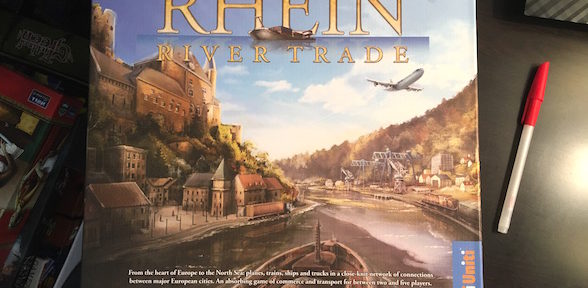
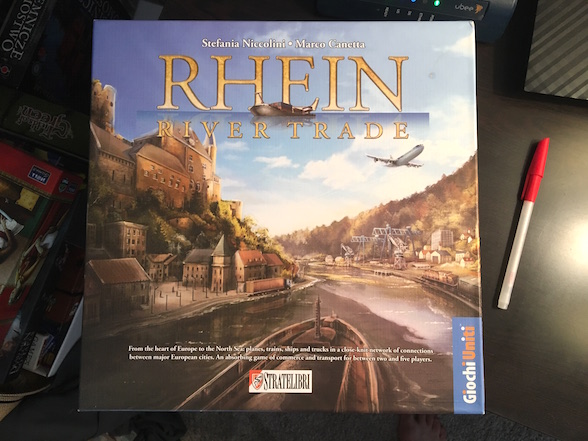
Thanks Ben for the game review and recommendations. I really want to go out and buy Concordia and Great Western Trail.